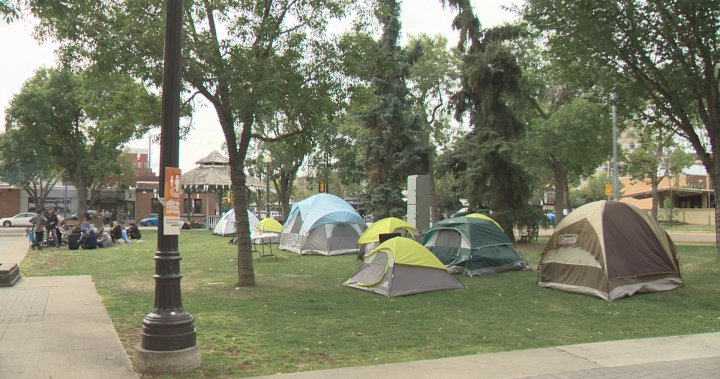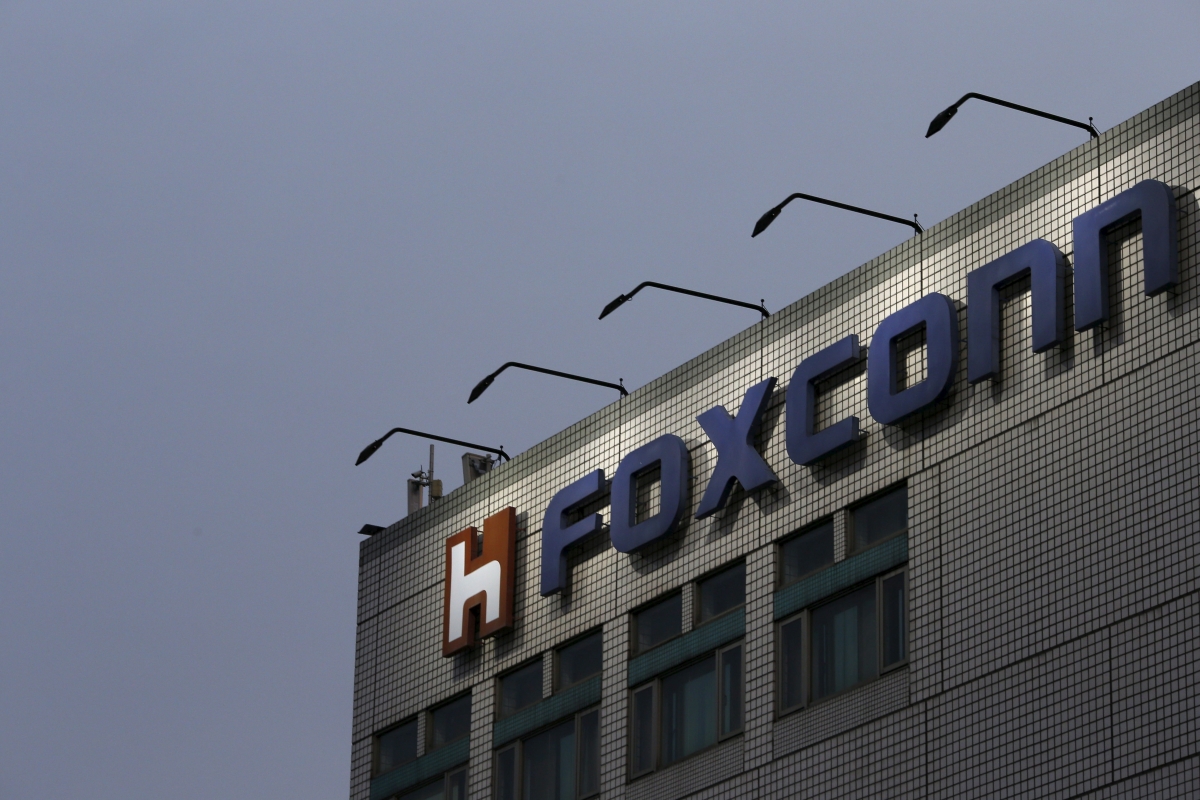As the City of Edmonton released a statement over the weekend where it committed to working with the Camp Pekiwewin organizers towards an end date for that camp, another encampment popped up in Old Strathcona.
On Saturday, a small encampment of tents had gathered at Dr. Wilbert Mcintyre Park off 83 Avenue and 104 Street.
“We want to give notice to Edmonton that the problem is not going to go away,” said Judith Gale, one of the outreach workers who helped organize the Old Strathcona camp. Gale said the group decided to gather after several encampments in the River Valley were shut down by the city recently.
“We have peace officers going down into the River Valley slicing up tents of human beings that have nowhere else to go,” Gale said. “Where are they going to go?
“Take them out of the River Valley, where they’re unseen — they’re going to be seen right in the middle of Edmonton now.”
The City of Edmonton released a statement on Saturday saying it is “concerned about illegal encampments” and wants to work towards closing down the large camp — Camp Pekiwewin — that has been stationed in the Rossdale neighbourhood near RE/MAX Field since early August.
“We owe it to the safety and dignity of those who are on the site, to the permanent residents of Rossdale who are eager for a solution and to the wider population of Edmonton who believe that a city such as Edmonton must be able to do better for its vulnerable citizens,” the statement from interim city manager Adam Laughlin said.
The city estimates about 1,900 people are homeless and 500 to 600 of them choose not to use shelter facilities and camp outdoors every night.
“We understand the city wants an end date for the camp,” Shima Robinson, the media liaison for Camp Pekiwewin, said Sunday.
“The end date…. that has to be the result of increased services and supports for people living on site.
“We’re not prepared to walk off site and just leave people there without their necessary supportive services in place.”

Image of the Camp Pekiwewin in the area of 96 Street and 104 Avenue, taken in August 2020.
Chris Chacon/Global News
The statement from the city also said it “refute(s) the claim that the city slashes tents or destroys property thoughtlessly.”
“We address encampments on public land by identifying and prioritizing high-risk encampments for closure, working with partners to engage individuals with support and connections to housing, and conducting coordinated closures and clean-ups.”
Robinson said the organizers at Camp Pekiwewin meet with city officials every Wednesday morning. She said that while the group understands that winter is coming and a solution needs to be found soon, she believes there is a middle ground where some of the demands of the group can be met.
“We’re not surprised by the city’s urgency in shutting down the camp, however this is a dialogue we’re in. And that dialogue should be honoured in a way that allows us to speak our piece as camp organizers in coordination with the city. That’s the entire aim of meeting with them,” Robinson said.
The Camp Pekiwewin group has a list of demands it has presented the city and public — including an end to tent slashing homeless camps, a review of bylaws that “perpetually erode the security, safety and dignity of people with no fixed address,” more transitional supports for those who have been institutionalized or through the foster care system, an emergency fund for front-line workers, free transit, and the official declaring of Pekiwewin grounds to remain a reclaimed, accessible, active ceremonial site.
“We’re on board to collaborate and communicate with the city,” Robinson said. “We have to. The city has the resources. We are donation-driven and volunteer-led.”
At the end of August, Edmonton Mayor Don Iveson put forward a plan to end homelessness in a 10-week period — before winter.
Read more:
Edmonton mayor requests help from Trudeau government to end city’s homelessness before winter
Iveson said he was requesting federal financial aid to help move people without places to live into bridge or transitional housing.
Robinson said Sunday the Iveson had visited the camp himself last week and met with those who lived there.
Gale added the reasoning behind the second camp was to bring more attention to the problem — and how widespread it is.
“This is a human rights issue,” Gale said. “It’s a domino effect of a greater systemic problem that we have in Canada. It’s our personal responsibility to help where our systems have failed. What I’ve been noticing since I’ve been doing street outreach is the demographic has changed quite a bit. Now, it’s the younger generation.
“Here we have a bunch of young people, that don’t have any direction. And we need to help them in that regard, give them some good direction and good love.”

In the statement released this weekend, the city said it was committed to long-term solution that isn’t a camp-type situation.
“Neither shelters nor camps are the right long term solution for homelessness. What needs to be in place is permanent housing with supports and treatment available for those who are suffering from addictions, mental health issues and historic trauma.
“The six demands of the Camp Pekiwewin organizers are broad. They are about long-term social change, and we are interested in joint problem solving towards many of their aims. But, the city cannot allow illegal camps to drive policymaking. To that end, we will be working towards a peaceful wind-down of the camp and ongoing discussions about social reform.”
© 2020 Global News, a division of Corus Entertainment Inc.

Devoted web advocate. Bacon scholar. Internet lover. Passionate twitteraholic. Unable to type with boxing gloves on. Lifelong beer fanatic.





